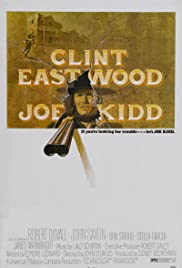
JOE KIDD
US, 1972, 88 minutes, Colour.
Clint Eastwood, Robert Duvall, John Saxon, Don Stroud, Stella Garcia, James Wainwright, Paul Koslo, Dick Van Patten.
Directed by John Sturges.
Joe Kidd is a small western in comparison with so many that Clint Eastwood made. It comes after his Sergio Leone trilogy, five years after The Good, The Bad and the Ugly. In the meantime, the former television star of Rawhide had returned to Hollywood, making a number of films including westerns like Hang ‘em High and the action adventure Where Eagles Dare. He had also sung in Paint Your Wagon. A year or two before, Eastwood had begun directing with Play Misty For Me and this film came out the same year as his first western that he directed, High Plains Drifter. In 1971 he had also appeared as Dirty Harry. For the next three and a half decades, Eastwood was at the top of his craft both in acting as well as directing, winning two Best Director Oscars for Unforgiven and Million Dollar Baby.
This is a more modest film with Joe Kidd as a cowboy siding with a Mexican against a group of bounty hunters. John Saxon is the Mexican, Robert Duvall the leader of the bounty hunters.
The film is conventional but very well made since the director was John Sturges who after a number of smaller films in the 1940s and early 1950s made Bad Day at Black Rock. He also made The Old Man and the Sea with Spencer Tracy. However, with Never So Few he began to make bigger-budget films which led to such blockbusters as The Magnificent Seven and The Great Escape. Towards the end of his career he made The Eagle Has Landed.
Not a well-known Clint Eastwood film but one which fits very well into his CV.
1. A good western, enjoyable? The focus on the name of the hero via the title?
2. The importance of colour and locations, musical background? The film as a Clint Eastwood vehicle? The particular style and qualities of an Eastwood western?
3. Audience interest and involvement in the western structure, the resolution? The standard structure for a western?
4. The importance of the early introduction to Joe; the trouble that he caused in the town, his background as a rancher, justice being administered on him, his ironic attitude towards being in jail, what was revealed about him in his court case? The ordinary man of the west, his belief in being able to do what he liked? Much indication of tho- hero to be? Did he have heroic qualities which needed drawing out?
5. The picture of the town? Mitchell's role as sheriff, the judge and his way of administration of the law, his being rescued by Joe Kidd, the posse and the people who belonged to it, life at the bar? The standard values of the
west, law and order, right and wrong, land and deals?
6. The contrast with Chama? As one of the oppressed and their leader, a man of vengeance, his philosophy of an eye for an eye as explained to Joe Kidd and after his helping Helen? The justice of the land situation? His violence, the fact that he then became a victim, being pursued by Frank Harlan and what he stood for? Chama’s relationship with Helen? His violence in attacking Eddie’s ranch? The decision about whether to let the hostages die or not? A man of violence who allowed himself to be persuaded to go to law? His motivation for this? His participation in the shoot-out? The moral of his submitting himself to administration and justice?
7. The contrast with Harlan and the evil that he represented? His values of right and wrong, greed, ownership of land and his ruthlessness? The posse and his henchmen and the types reflecting aspects of his violence, for example, Lamarr and his brutality, Roy and his cynical posing? Harlan and his poses of arrogance, hiring Kidd, eager to ferret out Chama, the hatred, Shooting, innocent people, and torturing them, the hostages and his willingness to kill them, his getting rid of Joe Kidd when he did not need him any more? The reasons for his accepting the challenge in the town? The movements throughout the court house before his death? The fact that he was executed by Joe Kidd? Did Joe Kidd have the right to kill Frank Harlan in this way?
8. Understanding Joe in the light of Chama and Harlan? The initial image of the west, his offhand attitude to Harlan’s girl, his experience of Harlan and his motivation? As asking for more money? His reaction to the cold-blooded murder? His wanting to help the tortured man? His admission of an error of judgement? His administration of justice on Harlan? his shrewdness in manipulating the individual numbers away? A saviour figure for the imprisoned hostages?
9. The importance of the shoot-out as part of the western convention, the added value of the train through the bar? A climax and a build-up appropriate to the shoot-out and these aspects of western law and order?
10. What are the values of the American west, as expressed in the conventions, as visualized in the seventies, for a response from world-wide audiences of the seventies?